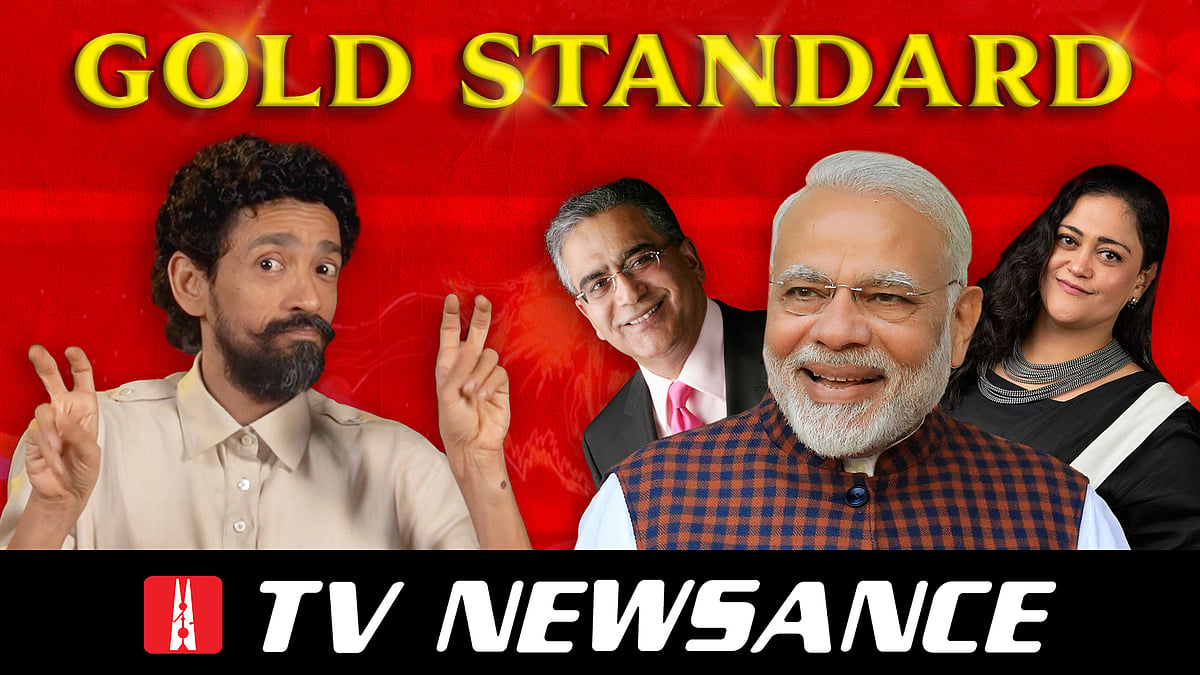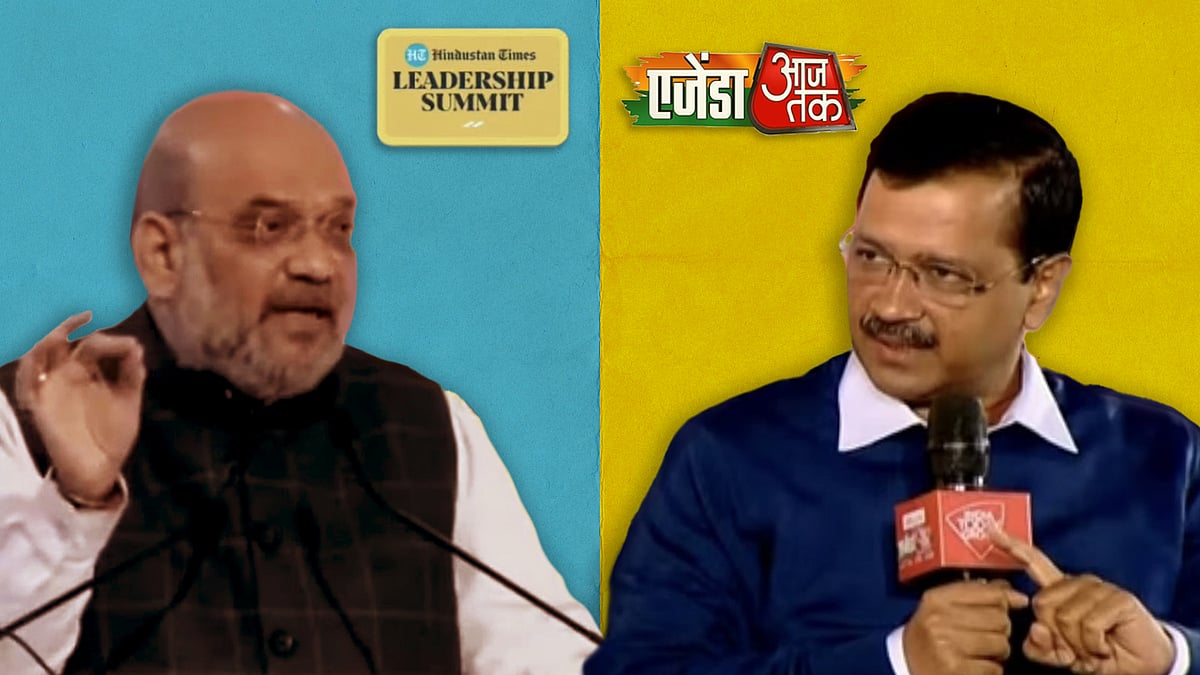At the India Today Conclave, Kalli Purie takes one for Team Godi Media
We truly know how certain media houses justify the ‘work’ they do.
Indian mainstream media generally has a thick skin. This is somewhat essential when you’ve collectively decided to cheer the government, blithely regurgitating the government line with no time for anyone who might condemn or criticise this cravenness.
But this all changed over the weekend.
Delivering the vote of thanks at the two-day India Today Conclave 2024 in Delhi on March 16, Kalli Purie came out swinging against critics. The vice-chairman and executive editor-in-chief of the India Today Group launched a broadside against people who deign to criticise the India Today Group for being pro-government.
The crux of Purie’s speech was to push back against criticism of “Godi media” – a term popularised by journalist Ravish Kumar to refer to news channels that have hopelessly devoted themselves to the cause of Prime Minister Narendra Modi and the Bharatiya Janata Party.
Notably, Purie all but admitted that the India Today Group is part of this noble tribe, she just didn’t see it as troublesome.
“What can you do about the fact that some media now prides itself in explaining the government’s point of view with well-argued facts and graphics – and they do so without any pressure from the government?” Purie asked. “Are they independent? Are they media? Are they propaganda?”
Well, yes. But we’ll get to that.
“The media cannot play the role of the opposition. Expecting it to do it leads to unfair charges of Godi or Modi media,” she said. “If the opposition is in disarray, the media cannot be blamed for it. We cannot present another side equally strongly if it doesn’t exist. We are observers in this boxing match. We are not the players.”
She added, “This is not about fear. This is a matter of rules, roles and competence. We are the medium, we are not the message.”
Let’s unpack.
The role of the media
It was at this very same India Today conclave that Home Minister Amit Shah and Finance Minister Nirmala Sitharaman gave their first reactions to the electoral bonds data published by the Election Commission on March 14.
Shah recycled the BJP’s demonetisation line to say the bonds were introduced to “wipe out black money” and now he’s worried that “black money” would return. (Side note: Black money’s gone nowhere in India.) He also, no doubt accidentally, mentioned a substantially lower number when talking about the money his party received by way of these bonds. Sitharaman said it was an “assumption” that some companies purchased bonds after facing central agency action. (Read Newslaundry’s extensive coverage of the issue for the facts.)
Prime Minister Modi, meanwhile, waxed eloquent on how he works “towards deadlines, not headlines” and how he’s “preparing for 2047”. He also spoke of himself in third person, as is his wont, saying “Modi goes beyond dreams”.
Were any of these stalwarts questioned? Not really, despite Purie’s assurance that her newsroom of “strongly opinionated, argumentative, rebellious, questioning, hustling individuals” is not “afraid to ask questions”.
Now, Purie is not alone. Her statements typify the sort of justifications wheeled out by newsrooms for the ‘work’ they do, at least internally. She’s just the only one gracious enough to have offered up a précis of their thought process for public consumption.
The job of the media is, and always has been, to hold the government accountable. Everyone has a bias, journalists especially, but journalism must be rooted in fact, not fantasy or fiction, and the work of journalists starts and ends with holding the powerful to account. Vivek Agnihotri may think “facts are not facts”. Purie herself said “alternative facts and truths are available” nowadays. But there are no “versions” of the truth. There are only newsrooms and how they spin stories in ways that suit them.
And many, many newsrooms in India have committed to a Modi spin – playing up “narratives” that suit government agendas, vilifying communities, and peddling half-truths and untruths in furtherance of this cause.
What’s curious about Purie’s speech is that she basically admitted to it. But she described it as “explaining the government’s point of view with well argued facts and graphics”.
Legendary American editor Katharine Graham is supposed to have said, “News is what someone wants suppressed. Everything else is advertising.” By that very simple yardstick, Purie’s boast about their newsroom explaining the government’s point of view is nothing more than advertising. And she seems to be proud of it.
The most quoted segment of her speech was when she said: “We are observers in this boxing match, we are not the players. If one side is weak or doesn’t show up, we cannot jump into the ring. This is not fear. This is a matter of rules, roles and competence. We are the medium, we are not the message.”
This is an almost clever bit of sophistry. Ostensibly about neutrality, it sidesteps the responsibility of journalists to hold the government in power to account, and attempts to present it as just two sides to a story, with equal weight.
In Purie’s mendacious attempt to defend what she does, perhaps she’s introduced a brand-new definition of journalism itself.
Red carpet for PM
Of course, it wasn’t all bad at the conclave. In fact, Rajdeep Sardesai went off script and pointed out the BJP government at the centre doesn’t have a single Muslim MP and that nearly 13 percent of the population is being “invisibilised”.
“There is a systematic invisibilisation of the Muslim…An indoctrination has set in. And I think since we’re in a media conclave, we in the media should also look inside. How much have we done to spread these kinds of stereotypes, prejudice and the worst kind of hate politics that targets people because of the community they belong to?” he asked.
SIMPLY BRILLIANT 👏🏾👏🏾👏🏾👏🏾👏🏾👏🏾@sardesairajdeep 👏🏾👏🏾🙏🏿 pic.twitter.com/aut0Hrt2YT
— M G (@movohra) March 20, 2024
But we returned to regular programming when Puri’s father Aroon, also founder and chairperson of the India Today Group, devoted himself to telling Modi why he was such a wonderful prime minister.
To start off, Modi – as India Today’s 2023 newsmaker of the year – got a red-carpet entry to the conclave, taking the stage with the two Puries. Next, Aroon devoted himself to reeling off Modi’s achievements in the past year: a successful lunar mission, a successful G20, inauguration of the new Parliament building, a “new exhibition space” in Bharat Mandapam, the Women’s Reservation Bill, “fast trains, expressways and airports”, and “overhauling” India’s colonial-era laws.
And, of course, the “grand rebirth of Ayodhya” through building a “magnificent Ram Mandir”, said Aroon, cheerfully whitewashing the rebirth’s turbulent past. The audience screamed in excitement.
“What a phenomenal year!” he said.
Then again, Aroon was following in his own footsteps, treading the same path we saw at the India Today Conclave last year, when Modi was in attendance too.
Back to 2024.
“Sir, I recently spent some time in America and had a chance to observe the society and democracy in close quarters,” Aroon told Modi. “The divisions in their society seem almost insurmountable. The distress is so deep and wide. Everyone believes their own truth...I think the world will look once again to you and to India...on how to navigate the modern democracy.”
After all, why critique when you can crawl? But Aroon is right in waffling about people believing their “own truth” – because India Today is clearly buying what it’s selling.
And here’s what it sells: Its star anchor rode a bulldozer to eulogise the government’s targeting of Muslim properties. Another ate food for elephants to rapture over a billionaire’s son building a zoo, even though it’s mired in controversy. A BJP MP booked for terrorism was given free reign to talk about types of “jihad” and why Nathuram Godse is a deshbhakt. Its magazine regularly disguises advertorials as news reports. And it invented details to carry out a “sting operation” at a madrasa. All this while it regularly toes a muscular line on how the government is always right.
Deserving his own category is Sudhir Chaudhary, who left Zee News to join Aaj Tak in July 2022. His body of work over the years includes Muslim dogwhistles, drawing up a jihad chart, performing “DNA tests” to shame voters, slandering college students, bizarre statements on “Adivasis in the jungle”, and regular laments on “tukde tukde gang” and “Khalistanis”,
But, in Purie’s words, India Today merely wants to build “bridges across the right and left” to “pierce holes into partisan echo chambers”.
Is Aroon’s toast to Modi’s achievements an attempt to bridge a divide? Does India Today’s “clean last mile of information” really do anything for minorities? Or does everything feed into a sprawling PR machine that spews everything the government wants to hear?
Journalists are, by the very nature of their jobs, a somewhat smug species. After all, journalism is in public interest and it’s a thankless job, plagued by long hours, thankless work, low salaries and little protection. Those who are doing it right are at the receiving end of attacks, assaults, arrests and agency action. But the smuggest of all are those who tell themselves that fawning over the governing party is actually an exercise in journalism.
Complaining about the media is easy. Why not do something to make it better? Support independent media and subscribe to Newslaundry today.
 TV Newsance 206: A ‘new normal’ at the India Today Conclave
TV Newsance 206: A ‘new normal’ at the India Today Conclave HT, Aaj Tak summits: 'Punjabiyat' is bhangra, Shah answers ‘all questions’ and Kalli Purie plays referee
HT, Aaj Tak summits: 'Punjabiyat' is bhangra, Shah answers ‘all questions’ and Kalli Purie plays referee
NL Digest
A weekly guide to the best of our stories from our editors and reporters. Note: Skip if you're a subscriber. All subscribers get a weekly, subscriber-only newsletter by default.
